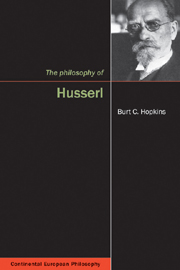Book contents
- Frontmatter
- Contents
- Acknowledgements
- Abbreviations
- Prolegomenon: Husserl's turn to history and pure phenomenology
- I Plato's and Aristotle's theory of eidē
- II From descriptive psychology to transcendentally pure phenomenology
- III From the phenomenology of transcendental consciousness to that of monadological intersubjectivity
- IV From monadological intersubjectivity to the historical a priori constitutive of all meaning
- V The unwarranted historical presuppositions guiding the fundamental ontological and deconstructive criticisms of transcendental philosophy
- 16 The methodological presupposition of the ontico-ontological critique of intentionality: Plato's Socratic seeing of the eidē
- 17 The mereological presupposition of fundamental ontology: that Being as a whole has a meaning overall
- 18 The presupposition behind the proto-deconstructive critique of intentional historicity: the conflation of intrasubjective and intersubjective idealities
- 19 The presupposition behind the deconstruction of phenomenology: the subordination of being to speech
- Epilogue: Transcendental-phenomenological criticism of the criticism of phenomenological cognition
- Coda: Phenomenological self-responsibility and the singularity of transcendental philosophy
- Notes
- Bibliography
- Index
18 - The presupposition behind the proto-deconstructive critique of intentional historicity: the conflation of intrasubjective and intersubjective idealities
from V - The unwarranted historical presuppositions guiding the fundamental ontological and deconstructive criticisms of transcendental philosophy
- Frontmatter
- Contents
- Acknowledgements
- Abbreviations
- Prolegomenon: Husserl's turn to history and pure phenomenology
- I Plato's and Aristotle's theory of eidē
- II From descriptive psychology to transcendentally pure phenomenology
- III From the phenomenology of transcendental consciousness to that of monadological intersubjectivity
- IV From monadological intersubjectivity to the historical a priori constitutive of all meaning
- V The unwarranted historical presuppositions guiding the fundamental ontological and deconstructive criticisms of transcendental philosophy
- 16 The methodological presupposition of the ontico-ontological critique of intentionality: Plato's Socratic seeing of the eidē
- 17 The mereological presupposition of fundamental ontology: that Being as a whole has a meaning overall
- 18 The presupposition behind the proto-deconstructive critique of intentional historicity: the conflation of intrasubjective and intersubjective idealities
- 19 The presupposition behind the deconstruction of phenomenology: the subordination of being to speech
- Epilogue: Transcendental-phenomenological criticism of the criticism of phenomenological cognition
- Coda: Phenomenological self-responsibility and the singularity of transcendental philosophy
- Notes
- Bibliography
- Index
Summary
Derrida's pre-or proto-deconstructive work focuses above all on opposing Husserl's concept of intentional history to empirical history, to the history that falls under Husserl's transcendental epochē and is therewith “bracketed” and “put out of play”. Indeed, in order to highlight this opposition, Derrida speaks of intentional history as “transcendental historicity” (Derrida [1978] 1989: 121). Derrida characterizes this opposition by drawing attention to the role Husserl assigns to language generally and written language pre-eminently in the constitution of the historicity of the objective meanings at stake in “transcendental historicity”. For Derrida, the phenomenological condition of possibility belonging to Husserl's early static investigations of objective meanings involves the exclusion of both empirical history (and therewith seemingly history per se) and the empirical significance of words (and therewith seemingly language per se), an exclusion that Derrida takes to be what Husserl thinks ensures the “purity” necessary for the phenomenological cognition of objective meanings.
In contrast, Derrida takes note of the fact that, as we have seen, in Husserl's late essay “The Origin of Geometry” language and history are not excluded from Husserl's account of the origin of the objectivity of the ideal meanings that, as a mathematical science, belong to geometry. On the contrary, it is language, in the guise of the graphic embodiment of words, which is to say, “writing”, that Husserl maintains is responsible for the objectivity – in the sense of the enduring intersubjective accessibility that constitutes the phenomenological meaning of a tradition – of the ideal meanings constituted by the first geometer.
- Type
- Chapter
- Information
- The Philosophy of Husserl , pp. 246 - 253Publisher: Acumen PublishingPrint publication year: 2010

